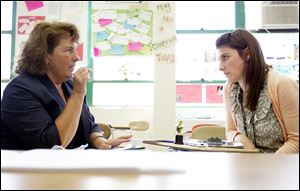
Teacher evaluations stir debate in D.C.
Some educators decry assessments resulting in dozens of dismissals
7/3/2011
Mary Gloster, a master educator, consults with Emily Strzelecki, a first-year science teacher at Washington's Ballou High School. Ms. Strzelecki survived the evaluation, but many teachers do not.
WASHINGTON -- Emily Strzelecki, a first-year science teacher, was about as eager for a classroom visit by one of the city's roving teacher evaluators as she would be to get a tooth drilled.
"It really stressed me out because, oh my gosh, I could lose my job," Ms. Strzelecki said.
Her fears were not unfounded: 165 Washington teachers were fired last year based on an evaluation system that places significant emphasis on classroom observations; this month, 200 to 600 of the city's 4,200 educators are expected to get similar bad news, in the nation's highest rate of dismissal for poor performance.
The evaluation system, known as Impact, is disliked by many unionized teachers but has become a model for many educators. Spurred by President Obama and his $5 billion Race to the Top grant competition, some 20 states and thousands of school districts are overhauling the way they grade teachers, and many have sent people to study Impact.
Its admirers say the system, a centerpiece of the three-year tenure of Washington's former schools chancellor, Michelle Rhee, has brought clear teaching standards to a district that lacked them and is setting a new standard by establishing dismissal as a consequence of ineffective teaching. Ms. Rhee, a graduate of Toledo's Maumee Valley Country Day School, left the D.C. schools in 2010.
Some educators say it is better at sorting and firing teachers than at helping struggling ones; they note that the system doesn't consider socioeconomic factors in most cases and that last year 35 percent of the teachers in the city's wealthiest area were rated highly effective, compared with 5 percent in the poorest area.
"Teachers have to be parents, priests, lawyers, clothes washers, babysitters, and a bunch of other things" if they work with low-income children, said Nathan Saunders, president of the Washington Teachers Union. "Impact takes none of those roles into account."
Jason Kamras, architect of the system, said "it's too early to answer" whether Impact makes it easier for teachers in well-off neighborhoods to do well but pointed out that Washington's compensation system offers bigger bonuses ($25,000 vs. $12,500) and salary enhancements in high-poverty schools.
The system leans heavily on student test scores to judge about 500 math and reading teachers in Grades 4 to 8. Ratings for the rest of the city's 3,600 teachers are determined mostly by five classroom observations annually, three by their principal and two by so-called master educators, most recruited from outside D.C.
For classroom observations, nine criteria -- "explain content clearly," "maximize instructional time," and "check for student understanding," for example -- are used to rate the lesson as highly effective, effective, minimally effective, or ineffective.
These five observations combine to form 75 percent of these teachers' ratings; the rest is based on achievement data and the teachers' commitment to their school communities. Ineffective teachers face dismissal. Minimally effective ones get a year to improve.
Impact costs the city $7 million a year, including pay for 41 master educators, who receive about $90,000 a year and conduct about 170 observations each. The program also asks more of principals. For example, Carolyne Albert-Garvey, principal of Maury Elementary School on Capitol Hill, has 22 teachers and must conduct 66 observations.
Several teachers said they considered their ratings unfair.
A veteran teacher, who said he did not want to criticize the school system openly, said that a month after he inherited a chaotic world history class from a long-term substitute, the visiting evaluator cut him no slack for taking on the assignment and penalized him because a student was texting during the lesson.
Another teacher who expects to lose her job because of low ratings said at a public hearing that evaluators picked apart her seventh-grade geography lessons, making criticisms she considered trivial.
"I'm 25 years in the system, and before, I always got outstanding ratings," she said. "How can you go overnight from outstanding to minimally effective?"
A report issued by the Aspen Institute in March said one of Impact's accomplishments was to align teacher performance with student performance, noting that previously 95 percent of Washington's teachers were highly rated but fewer than half of its students were proficient on tests. Still, the report quoted teachers who complained of cold-eyed evaluators.
"After my first conversation with my master educator, I felt it was going to be worthwhile," the report quoted one teacher. "My second master educator was kind of a robot, not generous in offering assistance."
This month, Mary Gloster, who taught science in three states before she was recruited to Impact in 2009, was at Ballou High, one of the city's lowest-performing schools, to share the results of some classroom visits.
She met with Mahmood Dorosti, a physics teacher who won a $5,000 award this spring. "Don't even think about it -- you're highly effective," she told him.
Next was Ms. Strzelecki, 23. The two sat at adjoining desks, with Ms. Strzelecki looking a bit like a doe in the headlights.
But Ms. Gloster, who had watched her teach a ninth-grade biology lesson the week before, offered compliments, along with suggestions about how Ms. Strzelecki might provide differentiated teaching for advanced and struggling students. "You did a really good job, kiddo," the evaluator ruled, grading her as effective, the equivalent of a B.
"What I liked about Mary was that I felt she was on my side," Ms. Strzelecki said later. "Some teachers feel the master educators are out to get them."